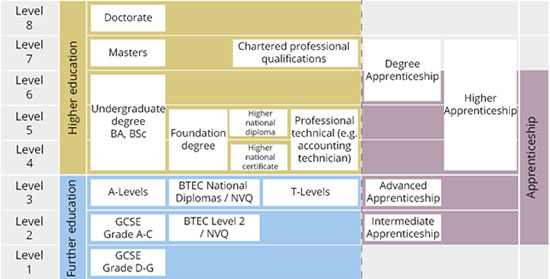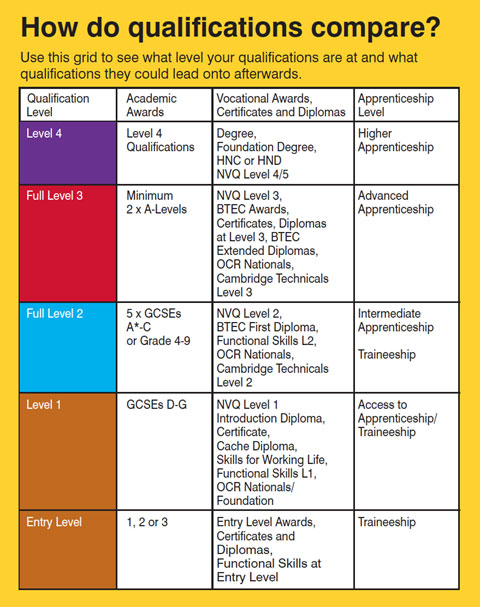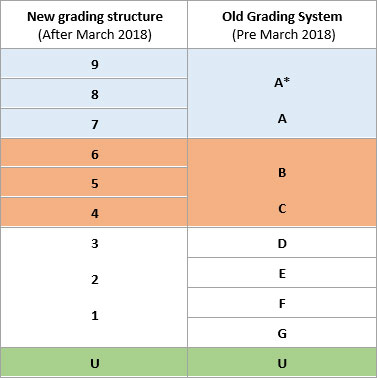Types of qualification
- GCSE
- A Level
- A/S Level
- BTEC
- TechBac
- T Level
- NVQ
- Functional Skills
- Core Skills
- Essential Skills
- Traineeships
- ILM
- IEQ
With so many qualification levels and descriptions it can sometimes feel challenging. As a starting point we have put together an overview of the levels and types of courses that you can choose from.
Please note: this is not a full list and qualifications available may change.
There are 9 qualification levels
Entry Level
Each entry level qualification is available at three sub-levels – 1, 2 and 3. Entry level 3 is the most difficult.
If you’ve no prior experience and you don’t feel confident about your abilities, then this level could be a good place to start.
- entry level award
- entry level certificate (ELC)
- entry level diploma
- entry level English for speakers of other languages (ESOL)
- entry level functional skills
Level 1
If you’re just starting out or are new to the subject area, this could be a good place to start.
- first certificate
- GCSE – grades 3, 2, 1 or grades D, E, F, G
- level 1 award
- level 1 certificate
- level 1 diploma
- level 1 ESOL
- level 1 essential skills
- level 1 functional skills
- level 1 national vocational qualification (NVQ)
Level 2
You will need to have previous experience of the subject.
- GCSE – grades 9, 8, 7, 6, 5, 4 or grades A*, A, B, C
- intermediate apprenticeship
- level 2 award
- level 2 certificate
- level 2 diploma
- level 2 ESOL
- level 2 functional skills
- level 2 national certificate
- level 2 national diploma
- level 2 NVQO level – grade A, B or C
Level 3
You will cover more complex work.
- A level
- access to higher education diploma
- advanced apprenticeship
- applied general
- AS level
- international Baccalaureate diploma
- level 3 award
- level 3 certificate
- level 3 diploma
- level 3 national certificate
- level 3 national diploma
- level 3 NVQ
Level 4
- certificate of higher education (CertHE)
- higher apprenticeship
- higher national certificate (HNC)
- level 4 award
- level 4 certificate
- level 4 diploma
- level 4 NVQ
Level 5
- diploma of higher education (DipHE)
- foundation degree
- higher national diploma (HND)
- level 5 award
- level 5 certificate
- level 5 diploma
- level 5 NVQ
Level 6
- degree apprenticeship
- degree with honours – for example bachelor of the arts (BA) hons, bachelor of science (BSc) hons
- graduate certificate
- graduate diploma
- level 6 award
- level 6 certificate
- level 6 diploma
- level 6 NVQ
- ordinary degree without honours
Level 7
- integrated master’s degree, for example master of engineering (MEng)
- level 7 award
- level 7 certificate
- level 7 diploma
- level 7 NVQ
- master’s degree, for example master of arts (MA), master of science (MSc)
- postgraduate certificate
- postgraduate certificate in education (PGCE)
- postgraduate diploma
Level 8
- doctorate, for example doctor of philosophy (PhD or DPhil)
- level 8 award
- level 8 certificate
- level 8 diploma
Please note: for progression onto higher lever courses you may have to prove existing knowledge, or have completed previous qualification levels to be eligible for the course.
GCSE converter table
Qualifications across the world
If you are entering the country and need to find your equivalent qualifications UK Naric can help you with a statement of comparability
“This service is for you if you need to evidence the level of your overseas qualification for employment, study, professional registration or another reason.”
Note: this is a payable service.
www.naric.org.uk/Qualifications/SOCResources
Below is a table which outlines all current qualifications that are being taken by students in education.

How do qualifications compare?



